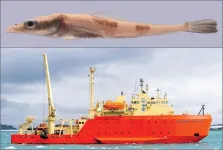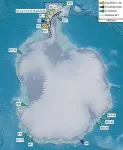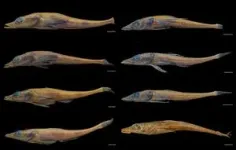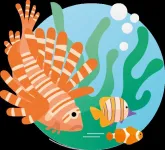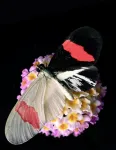(Press-News.org) A new species of Antarctic dragonfish, Akarotaxis gouldae or Banded Dragonfish, has been discovered in waters off the western Antarctic Peninsula by researchers at William & Mary’s Virginia Institute of Marine Science (VIMS). The species, named in honor of the recently decommissioned Antarctic research and supply vessel (ARSV) Laurence M. Gould and its crew, exemplifies both the unknown biodiversity and fragile state of the Antarctic ecosystem.
Described in the journal Zootaxa, Akarotaxis gouldae was initially identified through genetic analysis. Larval specimens collected off the coast of Antarctica while trawling for zooplankton were originally thought to be Akarotaxis nudiceps, a closely related dragonfish. However, after comparing their DNA to Akarotaxis nudiceps specimens housed in collections at VIMS, Yale University and the Muséum national d’Histoire naturelle in Paris, France, significant variations in mitochondrial gene regions suggested the larval samples were a species unto themselves.
Lead author Andrew Corso conducted the research while earning his Ph.D. at W&M’s Batten School of Coastal & Marine Sciences at VIMS under faculty advisors Eric Hilton and Deborah Steinberg. Using the DNA evidence as their guide, Corso and his colleagues requested the examination of adult Akarotaxis gouldae samples from numerous ichthyology collections around the world. Morphological differences became apparent between the two species once the adult samples were compared.
“There are two distinct bands on the sides of adult Akarotaxis gouldae that are not present on Akarotaxis nudiceps, so we were surprised that the species already existed in collections but had been previously overlooked,” said Corso. “In the world of fish taxonomy, it’s becoming common to distinguish species with genetics alone. Genetic testing is an extremely valuable tool, but our discovery highlights the importance of early life stage morphology and natural history collections like those at VIMS and other institutions.”
Genetic testing also revealed evolutionary clues. Using a process called time-calibrated phylogeny, Corso and coauthor Thomas Desvignes from the Institute of Neuroscience at the University of Oregon estimated that Akarotaxis gouldae diverged as a separate species approximately 780,000 years ago. During this time, most of the Southern Ocean was covered in glaciers.
“This process essentially looks at the rate of genetic mutations as a guide for a species’ evolutionary history,” said Corso. “We hypothesize that a population of dragonfishes may have become isolated within deep trenches under glaciers, surviving on food pushed in by the moving ice. Once the glaciers retreated, this subpopulation had become distinct enough to be reproductively incompatible with Akarotaxis nudiceps.”
Newly discovered, yet potentially threatened
Presently, Antarctic dragonfishes are poorly understood because they live in the remote Southern Ocean and spend most of their adult life in deep water. Prior research suggests these fishes engage in nest guarding in shallower coastal waters, and their offspring remain closer to the surface during their larval stage. Examination of female ovaries showed limited reproductive capacity. And while Akarotaxis nudiceps are distributed in waters surrounding the southern continent, analysis of larval sampling data suggests the distribution of Akarotaxis gouldae is limited to the waters around the western Antarctic Peninsula.
Dragonfishes are important prey items for many species, including Antarctica’s iconic penguins, whose populations have declined dramatically in recent decades. A 2022 study by Corso linked warming waters and reduced ice in the Southern Ocean to declines in Antarctic silverfish populations.
“Akarotaxis gouldae appear to have one of the smallest ranges of any fish endemic to the Southern Ocean,” said Corso. “This limited range combined with their low reproductive capacity and the presence of early life stages in shallower waters suggest that this is a vulnerable species that could be impacted by the krill fishery.”
The waters surrounding the western Antarctic Peninsula are heavily targeted by the international Antarctic krill fishery, which is managed by the Conservation of Antarctic Marine Living Resources (CCAMLR). Commercial fishing vessels trawl for krill in waters between 0-250 meters deep, and CCAMLR emphasizes the difficulties in correctly identifying larval and juvenile finfish bycatch in these operations.
“Since we know so little about the biodiversity of this area, we feel caution should be taken in extracting resources until we have a better understanding of the impact to the greater ecosystem,” said Corso.
Bringing attention to research while honoring a scientific legacy
The ARSV Laurence M. Gould was named after Laurence McKinnley Gould, the chief scientist on the first expedition to Antarctica. While most might assume Akarotaxis gouldae was also named in honor of the famous geologist, the researchers rather decided to honor the vessel for the significant scientific contributions of it and its crew.
The ARSV Laurence M. Gould supported the U.S. National Science Foundation’s Antarctic Program from 1997 until the non-renewal of its charter in April of this year. It was one of two U.S. ARSVs dedicated to studying the Southern Ocean. While a replacement vessel is in the design phase, the U.S. National Science Foundation explained the Gould’s charter was not renewed for economic reasons as well as shifting research priorities of the U.S. Antarctic Program.
The ARSV Laurence M. Gould and its crew provided significant support to Antarctic research carried out by VIMS and other institutions. Corso’s advisor Steinberg conducts long-term studies focusing on the effects of climate change on zooplankton communities around the western Antarctic Peninsula and their impact on the marine food web. Such research relies on regular sampling intervals, which must be adjusted based on the availability of support vessels like the Gould.
“To me, the loss of the ARSV Laurence M. Gould marks a setback in the scientific study of the Antarctic region,” said Corso. “Antarctica is warming faster than anywhere in the Southern Hemisphere, and there is untold biodiversity in the region that we’re only beginning to understand. By naming this fish after the ship, we hope to honor its scientific contributions while also bringing attention to the need for additional resources to study this unique ecosystem.”
END
New species of Antarctic dragonfish highlights its threatened ecosystem
2024-08-30
ELSE PRESS RELEASES FROM THIS DATE:
COVID-19 vaccination mandates boosted uptake among health care workers
2024-08-30
At the peak of the COVID-19 pandemic in 2021, governments and health care centers across the country faced a difficult but important question: Should health care workers be required to obtain the COVID-19 vaccine?
It was an economic quandary as much as an ethical one. Vaccine mandates could cause reductions in staff, either from workers missing time due to recovery from the vaccine or from opting to seek employment elsewhere. Additionally, health care workers are highly educated on the value of vaccines and had seen ...
New UMass study identifies factors that predict physical activity for nursing students
2024-08-30
AMHERST, Mass. -- New research from the Mechanical and Industrial Engineering Department at the University of Massachusetts Amherst, in collaboration with the Elaine Marieb Center for Nursing and Engineering Innovation, is helping to identify barriers to physical activity in nurses. Published in PLOS ONE, the study reports that the key factors influencing exercise include intrinsic motivation, certain types of social support, certain demographic identifiers and the use of health-tracking technology.
Nursing is a notoriously exhausting career, marked by irregular and long shifts and high physical demands. At the same time, prior studies show that about half ...
Auburn University secures two NSF grants to transform physics education
2024-08-30
Auburn University’s Department of Physics has been awarded two significant National Science Foundation (NSF) grants, marking a major step toward transforming physics education across all levels—from introductory courses to graduate studies. The grants, led by Assistant Professor Eric Burkholder, a specialist in Physics Education Research, aim to close the gap between traditional physics instruction and the complex problem-solving skills needed for real-world scientific challenges.
The cornerstone of these projects is the recognition that traditional methods of teaching physics—while ...
How hope beats mindfulness when times are tough
2024-08-30
A recent study finds that hope appears to be more beneficial than mindfulness at helping people manage stress and stay professionally engaged during periods of prolonged stress at work. The study underscores the importance of looking ahead, rather than living “in the moment,” during hard times.
Mindfulness refers to the ability of an individual to focus attention on the present, in a way that is open, curious and not judgmental. Essentially, the ability to be fully in the moment.
“There’s a lot of discussion ...
NASA, ESA missions help scientists uncover how solar wind gets energy
2024-08-30
Since the 1960s, astronomers have wondered how the Sun’s supersonic “solar wind,” a stream of energetic particles that flows out into the solar system, continues to receive energy once it leaves the Sun. Now, thanks to a lucky lineup of a NASA and an ESA (European Space Agency)/NASA spacecraft both currently studying the Sun, they may have discovered the answer — knowledge that is a crucial piece of the puzzle to help scientists better forecast solar activity between the Sun and Earth.
A paper published in the Aug. 30, 2024, issue of the journal Science provides persuasive ...
Biodiversity loss: Many students of environment-related subjects are partly unaware of the causes
2024-08-30
Worldwide survey by Goethe University FrankfurtFRANKFURT. Of the estimated 10 million, mostly still undiscovered species of flora and fauna on Earth, one million could become extinct in the next decades. This loss of biodiversity would have dramatic consequences, as animals and plants are providers of multiple services: They maintain ecosystems, ensure a more balanced climate on our planet, and supply us with food and active substances for medical drugs. Put bluntly: Without biodiversity, we humans will not survive.
That is why there is an urgent need for resolute political measures to counter the “sixth mass extinction” in Earth’s history. One group of people who are particularly ...
UTHealth Houston and Baylor College of Medicine collaborate on first CDC Injury Control Research Center in Southwest, established to study injury and violence prevention
2024-08-30
The only Injury Control Research Center in Texas has been established by the Centers for Disease Control and Prevention at UTHealth Houston in partnership with Baylor College of Medicine.
“I’m beyond thrilled to bring an Injury Control Research Center to Texas,” said Jeff Temple, PhD, director of the new center and associate dean for clinical research at UTHealth Houston School of Behavioral Health Sciences. “This collaboration between the community, policymakers, UTHealth Houston, and Baylor College of Medicine will undoubtedly save lives.”
An Injury Control Research ...
New findings on TB could change how we treat inflammatory disorders
2024-08-30
Tuberculosis is a confounding scourge. It’s the leading cause of death from infectious disease in the world, and yet it’s estimated that those deaths represent perhaps 5% of infections with Mycobacterium tuberculosis (Mtb). Antibiotics can take credit for saving the lives of some of those with Mtb, but a chasm nevertheless persists between the prevalence of infection and the targeted severity of its impact. A growing body of evidence suggests genetic vulnerabilities to TB account for that gap.
Now researchers from ...
Research Spotlight: A blood-based assay for the detection of IDH1.R132H-mutant gliomas
2024-08-30
Leonora Balaj, PhD, an investigator in the department of Neurosurgery at Massachusetts General Hospital and an assistant professor of Neurosurgery at Harvard Medical School, is co-senior author of a new paper in Nature Communications, Clinical Utility of a Blood Based Assay for the Detection of IDH1.R132H-Mutant Gliomas.
Bob Carter, MD, chair of Neurosurgery at Mass General, is co-senior author of the study. Syeda Maheen Batool, MD, an instructor in investigation in Neurosurgery at Mass General, is lead author.
Background:
Glioma represents the most common central nervous system cancer in adults. The current ...
Genomic dark matter solves butterfly evolutionary riddle
2024-08-30
[Note: High-resolution images related to this research available for download at this link. Caption and credit information provided.]
WASHINGTON (August 30, 2024) — A team of international researchers has uncovered a surprising genetic mechanism that influences the vibrant and complex patterns on butterfly wings. In a study published in the Proceedings of the National Academy of Sciences, the team, led by Luca Livraghi at the George Washington University and the University of Cambridge, discovered ...
